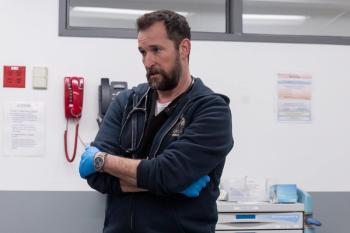
Sutter Health partners with Aidoc to expand AI in treating patients
Key Takeaways
The California health system has been named the company’s West Coast hub for innovating with AI. Elad Walach, CEO of Aidoc, and Laura Wilt of Sutter Health talk about the collaboration.
Sutter Health is teaming with Aidoc to expand the use of AI in the California health system.
But leaders with both Sutter Health and Aidoc say the partnership has broader implications.
Sutter is banking to expand the use of AI in treating patients, and Aidoc has designated the hospital system as its West Coast hub for innovation with AI.
The two organizations announced the partnership in June. Aidoc’s AI system will be integrated across Sutter’s system to help improve the process of imaging and identify patients who could be at a greater risk of stroke and other serious conditions. Based in Sacramento, Sutter operates 21 hospitals and serves more than 3.5 million residents in California.
Laura Wilt, chief digital officer of Sutter Health, tells Chief Healthcare Executive® that teaming with Aidoc is an important element of the system’s AI strategy.
“We want to really position ourselves to be a leader in AI, and really applying AI so it gets at scale to all of our providers and to all of our patients,” Wilt says.
“And we think imaging is such a great way for us to do that. It's really why we liked the partnership with Aidoc, because it's not one single algorithm. It's really this platform that we can apply across all types of imaging …. We think we can accelerate and be an innovation partner together with them, so that we can bring new types of models and new AI to our patients and providers,” she adds.
Elad Walach, CEO of Aidoc, tells Chief Healthcare Executive that he’s excited about the partnership with Sutter Health. He says the common desire that resonated with both organizations was the desire “to do something bold together.”
“It is developing a center of excellence for AI, right on the west coast, where the plan is to really have far-reaching implementation, going big scale, and really pave the way to dozens of AI use cases in very rapid implementation,” Walach says.
He says Sutter is aiming to develop a playbook of sorts for the different use cases for AI.
‘The whole job done’
Sutter Health is aiming to embed the Aidoc platform in every hospital in the system by the end of the year or early next year, Wilt says.
Wilt notes that she’s enthusiastic about going beyond “point solutions” that train AI models for imaging.
“That's why we're so excited about the partnership with Aidoc, because it's more like we can install it and then we can add algorithms,” Wilt says, adding that the goal is to look at more than one specific thing such as lung nodules. She says she’s looking forward to running different algorithms at the same time “in a really efficient way.”
Looking ahead, Wilt says she’s hoping the partnership with Aidoc leads to more comprehensive ways Sutter Health can serve its patients. She says she’s anxious to go beyond using AI tools to spot problems and “get the whole job done.”
“It's one thing to identify it or put it up in the queue,” Wilt says. “Now, how do we do the right follow up? How do we make sure that the patient's care is closed loop, and we're getting everything to the right person? So that's some of what we've talked about with them. Yes, the algorithms are the sort of beginning, and the platform enables that, but now we can really work to co-develop and co-create on … how do we really improve care?”
Going a step further, she talks about referrals and how simply scheduling an appointment for a patient to see a specialist is only part of the work.
“It's like, actually making sure the patient got to the specialist and got the information back to the primary care doctor, and so then we can continue the course of treatment,” she says.
- Read more:
Aidoc teams with Mercy to expand use of AI
‘An early leader’
Aidoc and Sutter Health teams are working in “a very tight fashion,” Walach says. Walach says Sutter Health has been “an early leader in clinical AI.”
“They did work in clinical AI, which is great,” he says. “But they said, ‘Look, I want to now grow from a few use cases to dozens.”
Walach stresses that the goal is to use AI-powered tools to help clinicians work more effectively, and it’s not about technology replacing physicians. He’s hopeful that AI can help reduce the number of diagnostic errors.
With physician shortages that don’t appear likely to improve, Walach says it’s more important to find ways to help clinicians become more efficient. But Walach says the big issue facing the healthcare industry is providing better care at a lower cost.
“How do we improve patient outcomes while reducing costs? Anything else, in my mind, is just the wrong conversation to have, especially right now,” Walach says.
Walach says Warner Thomas, president and CEO of Sutter Health, has proven to be a bold leader.
“He's a force of nature,” Walach says. “I mean, he's able to really create. It's not just him, by the way. I think the power of Warner is his team that loves him, follows him, believes in him, and is aligned with him. And I think that's really the power.”
Wilt also credits Thomas for his leadership and leaning into AI. She also says she’s excited to work with Walach and the Aidoc team in tackling big problems.
“We have this vision of how healthcare can improve and how we can work on it together, and that's what we see this as a partnership to do,” she says.





























































































